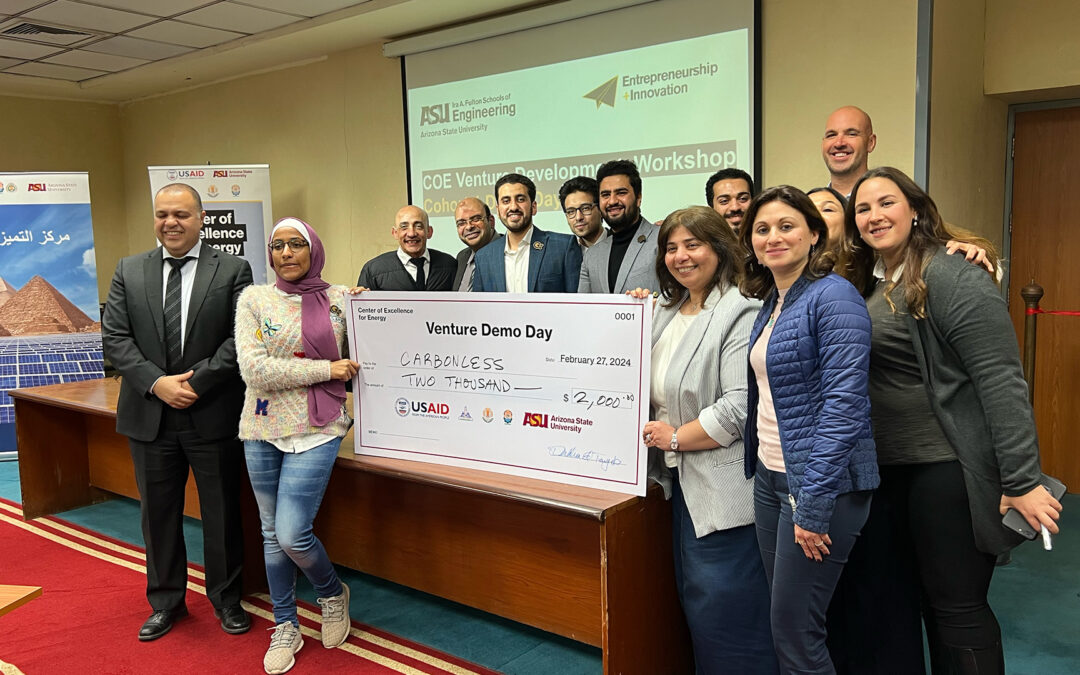The Center of Excellence for Energy, supported by the American people through the U.S. Agency for International Development, or USAID, and operated by Arizona State University, announced the winners of the Venture Development Program Demo Day. Led by Brent Sebold, director of the Entrepreneurship + Innovation program in the Ira A. Fulton Schools of Engineering at ASU, also known as E+I @ Fulton, the event was the culmination of a six-month entrepreneurship and innovation program in Egypt featuring two seminars, the selection of six venture teams based at Center of Excellence for Energy Egyptian partner universities, five months of mentorship by ASU faculty and a conclusion in a “Shark Tank”-style Venture Development Program Demo Day event.
The entrepreneurship and innovation program is part of the center’s efforts to advance higher education capacity in energy through curriculum development, research innovation and increased partnerships between higher education, energy industry and government agencies to support Egypt in reaching its goal of generating 42% of electricity through renewable sources by 2035.
“It is important for faculty to develop skills not only in the technical areas of their fields, but also in business, including proposal writing and venture development,” says Sayfe Kiaei, Center of Excellence for Energy project director and a Fulton Schools professor of electrical engineering. “This workshop will be a hands-on opportunity for faculty at our Egyptian partner universities to take a concept they have from idea to business venture, and they will be learning from one of the best in the field, Dr. Brent Sebold.”
The program kicked off in October when Sebold hosted a seminar on the foundations of entrepreneurship, which introduced Egyptian faculty and students to key organizational capacity development constructs as well as technology transfer-related concepts and models. Topics included lean startup and evidence-based entrepreneurial methods to discover problem-solution fits and readiness for product-market fit.
“The entrepreneurial mindset is integral to our learning outcomes because it enables impact within technology development,” Sebold says. “You can come up with a great invention, a novel way of solving a problem, but if you can’t combine that with an entrepreneurial mindset and a mission to create value in society then you’re not going to be able to scale that invention to the billions of people around the world who could really benefit from your solution.”
Interested faculty and student teams were asked to submit proposals for new business ventures and innovative solutions to Egypt’s energy challenges. Six teams were selected to compete for their share of $8000 in seed funding.
Sebold and other ASU faculty mentored the teams from October 2023 to February 2024. In February, Sebold visited Egypt to hold a second seminar, conduct in-person preparation and training and hold the Demo Day pitch presentation competition.
The three-day event kicked off with a seminar on university entrepreneurship and venture development. Participants from Ain Shams, Mansoura and Aswan Universities and industry professionals convened to learn from Sebold, who prepared them to navigate and contribute effectively to university entrepreneurship and venture development ecosystems.
The two-part session covered the importance of cultivating an entrepreneurial mindset, key strategies for innovation management and examples of successful venture development models. Before the day was over, participants learned how to design, manage and scale startup mentorship programs, innovation spaces and funding competitions tailored to any university ecosystem.
“The innovation is there, and so are the students and their ideas, but a few dots still need to be connected,” says Ahmed Fikry, director of the Technology, Innovation, and Commercial Office at Mansoura University. “Being here today, learning from what they have already done at Arizona State University and customizing it to our university environments helps connect some of these dots.”
During the second day, Sebold worked with the six venture development teams on their pitch presentations. After the teams’ five months of mentorship, they refined their pitches with Sebold and other venture development experts before competing for seed grant funding.
During Demo Day, the six venture teams pitched their fully developed business proposals for clean energy solutions to a panel of judges, and the winning ventures received a share of $8,000 each in seed funding from USAID to further develop their ideas.
“If you had asked me a few months ago what I wanted to do after graduation, I would have said seek employment at a company,” says Mohanad Ahmed, a senior at Ain Shams University and a member of the Eco Drive venture team. “But now, I want to develop my own startup, maybe even more than one. For me, this workshop changed the way I think.”
Sebold commended the teams for their dedication to addressing pressing energy issues.
“We don’t know if any one of these ventures is going to solve the climate crisis in the next six months or six years, but we do know that we’re chipping away at these individual problem statements in a novel way,” he says. “So, I’m very excited about the founders and the technologies being developed within these three partner schools.”
The first-place venture, Carbonless, received $2,000 for their renewable energy solution to decarbonize the maritime industry by capturing and repurposing carbon dioxide emissions. In second place, AgroVisioners received $1,500 to use artificial intelligence, or AI, in agriculture to control water and oxygen to improve crop quality and use fog to benefit agriculture.
In third place, BiAswan, which received $1,500, developed a plan to utilize agricultural and solid waste in the production of clean energy and fertilizers. Eco Drive placed fourth, receiving $1,000 for their proposal to use solar and wind energy generation technology mounted on vehicles’ roofs to power them.
Also receiving $1,000 for fifth place, Solar Heater proposed harnessing solar energy in homes with new technology to maintain water temperature in heaters. ThermalSync, which placed sixth and received $1,000, pitched using AI to select solar power plant locations, optimize plant efficiency and manage solar power generation systems.
